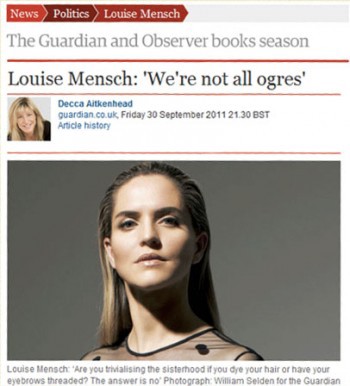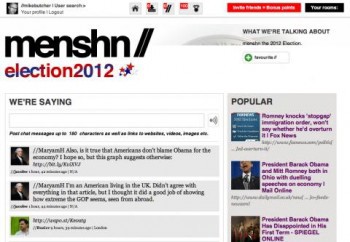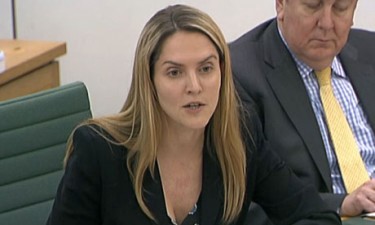The Unavoidable Louise Mensch
by Emma Garman

A series dedicated to explaining Britain’s manufactured celebrities to an American audience.
As has long been accepted by all right-thinking individuals, chick lit is to blame for modern society’s cruelest scourges, from the re-entrenchment of patriarchal attitudes to the rise of the $15 cocktail to my exhaustive familiarity with Jennifer Weiner’s opinions. Yet in our beleaguerment, we might have overlooked an even direr side-effect of those pastel-colored volumes, one that throws into disarray the very laws of existence.
I’m afraid there’s no easy way to say this, but it appears that chick lit plots are escaping from the confines of their pages and becoming real, like some dystopian nightmare conceived by Ridley Scott. Observers of British political life will be aware that last year, Tory MP and Leveson Inquiry star Louise Mensch married her second husband, Red Hot Chili Peppers manager Peter Mensch, in a secret New York ceremony. Eerily, the blushing bride’s debut novel, Career Girls — published in 1995 under her maiden name, Louise Bagshawe — features a plot in which a Jewish music mogul dumps his American wife, the mother of his three children, for a “willowy, blonde, coldly determined” Oxford graduate named Rowena. As Ms. Bagshawe’s lapidary prose makes clear, it was an irresistible union (that said, readers of an even slightly delicate disposition should feel free to skip ahead to the next paragraph).
He couldn’t tear his eyes off Rowena, her long, slender legs tumbling out of a light blue Krizia dress, her firm thighs shimmering in reflective hose, her small breasts clearly visible through the white Bill Blass shirt she’d chosen that morning. Her long hair fell loose and sleek around her shoulders, and her eyes were wide, her lips parted.
For weeks now she’d been like a trembling reed in his presence, so brimming with desire he could practically smell it.
Whew! It took sixteen years, but eventually life precisely imitated art (well, “art”). Those personally connected to Louise and her literary ilk are thus advised to bear in mind that, just when they least expect it, their lives could be turned upside down by whatever unholy force the trashy bonkbuster is apparently capable of unleashing. (In retrospect, we should have known that Candace Bushnell’s marriage to her ballet dancer was doomed the moment that Carrie and Baryshnikov broke up in the final season of “SATC.”)

Bagshawe’s composition of Career Girls wasn’t the first time she’d exerted her preternaturally powerful will in order to manifest her heart’s desire. While at Oxford University, where she studied English literature after attending a Catholic boarding school, she happened to catch a TV documentary on Def Leppard (a legendary 80s hair band, youngsters). Forming an instant pash on the band’s manager — yes, Peter Mensch — she manufactured the “Oxford Rock Society” out of thin air, nominated herself president, and invited him to speak at a conference. After some persuasion he agreed to attend, along with Sharon Osbourne, who, displaying the inimitable charm we’d all one day know and love, called Louise “a persistent bitch.” But, regrettably for our resourceful young madam, when her dream-man arrived in Oxford, he was newly married.
Still, it was thanks to Peter, who helped her get a job at EMI, and Sharon, who got her a job at Sony when she was fired from EMI, that Louise enjoyed a brief career in the music industry before churning out a few novel chapters and winning a publishing deal at the age of 22. She has now written fifteen “romance novels” with titles like Glamour, Passion, Glitz and Destiny, earning millions as a result. Each opus takes her about six weeks to write, a task easily squeezed into the parliamentary summer recess — although since becoming a Conservative Member of Parliament in May 2010, she’s toned down the explicit sex scenes. Offending her stuffy constituents isn’t the issue as much as the Honourable Member’s recent full-throttle embrace of the Catholicism she was raised in; she has also said that in “these straitened times” readers are less interested in “bedroom and boardroom” stuff. (Let us hope that predicting literary trends never falls among her multifarious enterprises.) So her next novel, Decade, will be “more literary,” she promises.
Not that Hilary Mantel and Co. should lose any sleep: Mensch’s demanding schedule means that she’s unlikely to trouble the literary prize circuit any time soon. The 41 year old shares custody of her three young children with her first husband, an American property developer, and on top of her duties as MP for Corby (an unglamorous town in the Midlands) and her position on the government’s Culture, Media and Sport Committee, she’s just launched Menshn, a social networking site, pitched as an alternative to Twitter, with the tagline “Talk on Topic.”

Before you ask, no, the name has absolutely nothing to do with her own, it’s simply a play on the word “mention.” Menshn distinguishes itself from Twitter by restricting the subjects open to discussion and — well, I’ll let its creator and non-namesake explain: “There are lots of forums but what they don’t do is live chat about something. If a new poll has come out at the height of the US election season and I want to go and obsess about it I can go into a (chat) room and talk to my fellow devotees about that or who Romney’s vice presidential pick is going to be, for example.” Now, your columnist is assuredly not au fait with web innovation, but doesn’t the concept of a live chat room seem slightly shy of groundbreaking? Anyhow, Menshn — which, in another radical selling point, allows 180 characters instead of 140 — has now gone live in both the US and the UK, to decidedly mixed reviews. (“I found it was awkward to use, extremely narrow in its focus and full of little glitches and slightly unintuitive moments,” wrote tech reporter Bobbie Johnson.)
The freewheeling, unpoliced character of other social networks is an issue close to Mensch’s heart. Having used Twitter to bolster her public profile, often tweeting many times a day from the House of Commons, she recently endured the site’s nasty flipside. In May, when the Culture, Media and Sport Committee released a report saying that Rupert Murdoch was “not fit” to lead a major international company, Mensch vehemently but quite mystifyingly declared on various news shows that, unlike her left-wing fellow committee members, she considered Murdoch senior to be a “great newspaper man” who was “obviously fit to run a major company.”
Cue a deluge of Tweets calling her a slut, whore, bitch and cunt and threatening physical violence — basically your standard issue chorus of ungrammatical misogyny. Mensch, of course, is made of jolly stern stuff, so she wasn’t cowed or even particularly ruffled, although she did draw attention to various abusive Tweets by “favoriting” them. “I don’t care at all about it,” she insisted. “Totally water off a duck’s back, but it might not be to someone who’s not a politician. Someone not so thick-skinned might be hurt by that, but it doesn’t bother me.” In demonstration of her rhinoceros hide, when footballer Joey Barton tweeted that she was “a fame hungry careerist” with “the personality of a crushed snail,” then acknowledged that the feeling was probably mutual, Mensch shot back “No, not mutual — I don’t think about you at all.”

Ironically, it was Mensch’s hyper-articulate questioning of the Murdochs during the Leveson Inquiry session on phone hacking that originally threw her into the international spotlight (which was even brighter than it might have been, thanks to her questions coinciding with that epochal moment when Rupert was pelted with a pie and Wendi landed one on the assailant). While Mensch’s co-interrogators waffled and equivocated, she maintained the air of an intimidating school principal cross-examining a couple of delinquent teenagers, the arguable highpoint being when Rupert Murdoch told her that no, he hadn’t considered resigning. Her supercilious response: “Why not?”
Inevitably, Mensch’s high-profile probing into media wrong-doing incurred reprisal. A few days after her questioning of the Murdochs and News International CEO Rebekah Brooks, she received an email from “David Jones Investigative Journalists,” accusing of her of various indiscretions, including taking drugs with violinist Nigel Kennedy when she was an EMI publicist. Mensch went on the attack, publishing both the email and her response to it, which among other airy assertions said: “Although I do not remember the specific incident, this sounds highly probable… since I was in my twenties, I’m sure it was not the only incident of the kind; we all do idiotic things when young…Most importantly, I have not the slightest intention of being deterred from asking how far the culture of hacking and blagging extended in Fleet Street.” Kennedy himself went on record to recall having “some great times” with Mensch, adding: “Louise is pretty scary and I would warn anyone that it’s not a good idea to mess with her.” And like magic, a scandal that could have destroyed her career ended up working in her favor, with even a Labour MP saying on TV that he did not care what Mensch “did in nightclubs in the 90s.”

The one time that Mensch’s formidable poise deserted her was when a Guardian journalist asked her directly if she’d had a facelift. “My God,” she said. “Um… OK… I’ve always wondered what I would say the first time somebody asked me this question. And without denying it, I’m going to refuse to answer your question, because as soon as I do that you become the minister for mascara. I’m not going to talk about my various and sundry beauty treatments, of which there are many. My beauty secrets are between me and my… as I say, various, er, therapists.” Those words triggered a frenzy of excited headlines and endless speculation about her looks, her surgical enhancement of those looks and, in more serious corners of the media, whether it’s legitimate to focus such attention on a woman who’s technically not a celebrity, but a lawmaker and public servant. The debate was reignited when Mensch said in a GQ interview that it was sexist “to trivialize a woman politician based on her appearance” — an unacceptable attempt to have her cake and eat it too, in the opinion of certain commentators, since in the accompanying photographs she’s wearing a nice outfit and some make-up.
For all her protestations, Mensch will be acutely aware that the media interest vital to any public career — be it in showbiz or showbiz for ugly people — is fueled by the perception of contradictions, in which she corners the market. A twice-married Catholic who’s made a fortune from writing about sex, Mensch is also a socially liberal right-winger, a pro-life feminist and, now, a web entrepreneur who on more than one occasion has called for social media to be censored. All of which helps ensure her continuing media ubiquity, which has become so unrelenting as to be a regular punchline. “You’ve got to page 32, and thought you had managed to avoid Louise Mensch,” ran a subhead on a recent Independent story about Menshn. “Sorry!”
So now that she has this unparalleled platform, what exactly does she plan to do with it? Despite Mensch’s regular and unconvincing demurrals about being politically ambitious, those who know her believe that her sights are set on the ultimate prize: becoming Prime Minister. She makes no secret of the fact that Margaret Thatcher is her longtime idol and role model, and given that her ferocious drive seems to easily equal the Iron Lady’s, Mensch’s occupation of 10 Downing Street is a perfectly feasible prospect. As she retorted to the journalist who grilled her about plastic surgery, “It’s my life. I can do what I want.” Only a fool would imagine otherwise.
Previously: Pixie Lott and Roman Abramovich
Emma Garman no longer lives in her native UK, but she still watches lots of its TV. She’s also on Twitter.
